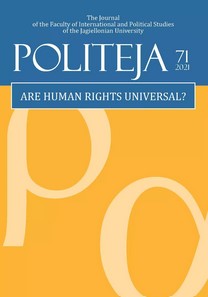MILITARIZING HATE, PERPETUATING VIOLENCE AND RAPE, AND ALLOWING HUMAN RIGHTS ABUSES TO GO UNPUNISHED
MILITARIZING HATE, PERPETUATING VIOLENCE AND RAPE, AND ALLOWING HUMAN RIGHTS ABUSES TO GO UNPUNISHED
Author(s): Maila Lee WomackSubject(s): Gender Studies, Criminal Law, Human Rights and Humanitarian Law, Civil Society, Security and defense, Studies in violence and power, Inter-Ethnic Relations, Penal Policy
Published by: KSIĘGARNIA AKADEMICKA Sp. z o.o.
Keywords: immigration; institutional racism; militarized policing; gendered violence; intersectionality;
Summary/Abstract: The United States does not comply with the International Convention on the Elimination of All Forms of Racial Discrimination (ICERD), which is the United Nations’ core binding anti-racism human rights convention. One hundred and seventy seven states, including the US, have ratified the anti-racism multilateral agreement. The nation entered into the pact in 1994 yet still has not implemented its obligations to the statute. This study focuses on the protections ICERD provides Latino immigrants who are not United States citizens as this group is often ignored in advocacy for implementation strategies. Areas where the United States does not comply with ICERD include discriminatory immigration policies and practices, violent and discriminatory policing, gendered violence, and inequalities in the criminal justice system. It is critical to examine ICERD’s protections for Latino non-citizens because it reveals how the group experiences racism differently than other people because they endure intersectional forms of systematic and institutional discrimination due to their race, ethnicity, citizenship status, gender, and other identity traits. Methodologies used in this study include analysis of ICERD’s monitoring body’s General Recommendations, and the monitoring body’s reports about the United States’ lack of compliance with the statute. These are the most powerful regulatory forces of the treaty due to the monitoring body’s positionality as experts about the pact appointed through the United Nations system.
Journal: Politeja - Pismo Wydziału Studiów Międzynarodowych i Politycznych Uniwersytetu Jagiellońskiego
- Issue Year: 18/2021
- Issue No: 71
- Page Range: 203-224
- Page Count: 22
- Language: English

